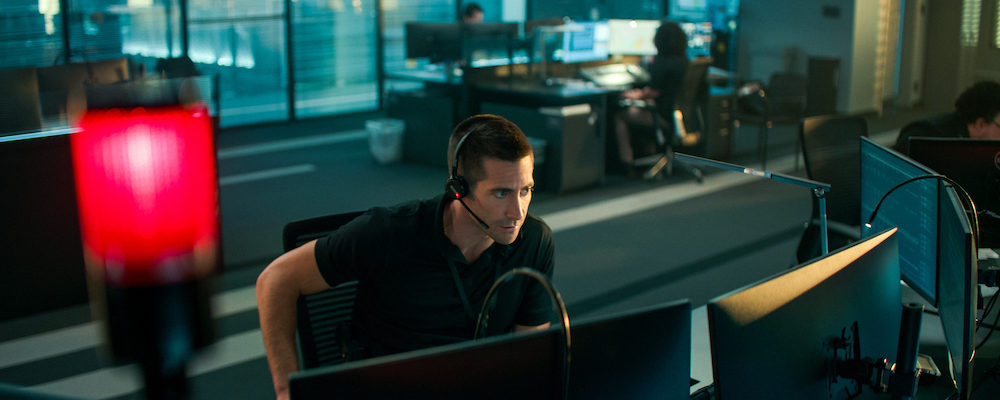Jake Gyllenhaal Captures Confined Tension in ‘The Guilty’
Alci Rengifo
Some remakes can justify themselves with pure craft. Such is the case with Netflix’s “The Guilty,” an American update of an acclaimed 2018 Danish thriller. While the original is more than worth checking out, viewers who come across this version by Antoine Fuqua will find a sharply tense experience driven by a strong performance courtesy of Jake Gyllenhaal. The style of this film has been done many times before, using an old budget-saving trick of making all the “action” take place over the phone. Cheaper but extremely difficult, this kind of storytelling requires a precise combination of directing, strong writing and capturing acting.
The screenplay by Nick Pizzolatto is set within a Los Angeles 911 dispatch center. Sitting in front of screens displaying the latest, massive local fires, Joe Baylor (Gyllenhaal) answers calls. His attitude is restless and mean. We learn Baylor was once an LAPD detective. He is due in court the next day. Whatever it is that got him in trouble has resulted in Baylor being demoted to a dispatcher. A call comes in from a woman in obvious distress. It sounds like she’s been kidnapped, possibly in a van. Baylor tries to get officers to track the vehicle down but so many fire-related calls are swamping the system. As he tries to track down the identity of the caller and her potential kidnapper, Baylor also faces pressures about his upcoming court date.
From here on out it should be avoided to reveal too much about “The Guilty.” Like the original, the entire film is confined to the world of the dispatch center. Baylor’s computer space, his cell phone, and the room where he eventually sequesters himself are all that comprise the film’s surroundings. Sometimes good directors need to return to simple, precise filmmaking. Fuqua has been a great action stylist since his 1998 debut, “The Replacement Killers,” through his best known work, “Training Day,” and recent action extravaganzas. Here he reunites with Gyllenhaal, who gave one of his best performances in Fuqua’s “Southpaw.” Together they make a film that’s purely about the acting and rhythm of its pace. The camera is always on Gyllenhaal, with a few interruptions from a supervising officer or another dispatcher sitting nearby.
Naturally this kind of movie also requires a bit of disbelief, to a higher extent than other cop thrillers. It’s doubtful this kind of archaic, riveting detective work ever takes place on a daily basis at a 911 dispatch center, but Gyllenhaal’s acting is so good we go with it. He builds tension by juggling different, crashing emotions. Baylor is desperate to help the woman on the other line, Emily (voice of Riley Keough), and calls her house only to find that her young children have been left alone. But then his wife, from whom he is now separated, calls, as in those days we all recognize when the wrong call rings at the worst moment. The only sense of action in the outside world comes precisely from voices. For “Training Day” fans there’s a great wink in Ethan Hawke doing the voice of Baylor’s sympathetic former sergeant, who is certain he will return to doing his work as a detective soon. Peter Sarsgaard is quietly perturbed as the potential kidnapper Baylor would like to strangle over the line.
What the better films in this genre, such as Joel Schumacher’s “Phone Booth” or Oliver Stone’s “Talk Radio,” have in common is directing that understands how to make confinement and dialogue exhilarating. Fuqua chooses his close-ups, wide shots and pans carefully, in order to evoke claustrophobia and visceral energy. The large office screens displaying Los Angeles fires also obscure the outer city, because all we see are flames and smoke. Editor Jason Ballantine practically gives a master class on how to cut the material in a way that never feels repetitive. The sound design has to also function in a way where we can vividly imagine what Baylor is hearing, because we are there in the seat with him, trying to picture events as they unfold. “The Guilty” is that rare kind of movie that has impressive visual skill, but you could enjoy it as an audiobook.
As the thriller involving Emily reveals twists and shockers along the way, the character of Baylor is slowly revealed to us in layers. By the end, Pizzolatto’s screenplay unveils deeper themes about the kind of mistakes the police can make, which have been so publicly discussed lately. Baylor carries a great guilt that manifests itself in his desperation to save a life, even in this job he obviously hates. The narrative becomes a unique twist on the idea of the hero cop, exposing just how flawed he is. A final phone call has a powerful catharsis you wouldn’t get in a lesser thriller. “The Guilty” may be a remake, but because the country has changed, so do its themes. Fuqua has found a way to keep the original structure intact, while turning it into something new and just as intriguing. The suspense delivers because the execution is killer.
“The Guilty” releases Sept. 24 in select theaters and begins streaming Oct. 1 on Netflix.

